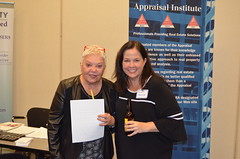Monthly Archives: January 2012
Congresswoman Judy Biggert: The ICAP Interview
By Rich deVerdier, SRA, ICAP
Chicago (ICAP) — Rep. Judy Biggert, in her first interview with ICAP answers questions about unemployment, federal programs, delinquency rates on real estate and more.
A lifelong Illinois resident, U.S. Representative Judy Biggert is currently serving her seventh term in the U.S. House of Representatives and in 2010,  Congresswoman Biggert was selected to serve on the final House-Senate conference committee during negotiations on the recent Dodd-Frank financial overhaul package.
Congresswoman Biggert was selected to serve on the final House-Senate conference committee during negotiations on the recent Dodd-Frank financial overhaul package.
At a recent speech given at a dinner hosted by the Appraisal Institute, Congresswoman Biggert said that “HVCC was a mistake, that it was a behind-the-scenes deal that didn’t allow input from stakeholders like appraisers, other federal and state regulators, or Congress”. Ms. Biggert went on to recognize that Appraisers have told her that HVCC decreased competition in at least three ways:
- By steering business away from independent appraisers and towards Appraisal Management Companies (AMCs);
- By suppressing appraiser compensation, and;
- By jeopardizing the integrity of residential appraisals.
The Illinois Republican said that the Dodd Frank Bill required the Federal Reserve to write new appraisal independence rules to replace the HVCC; however, unfortunately, they largely mirrored the HVCC. Ms. Biggert added that she supports rules and standards promoting appraisal independence and requires appraisers to meet high standards, “Appraisers should be allowed to have the flexibility to utilize any appropriate and accepted valuation methods and compete on a level playing field”. She also supports clear, common-sense disclosures that provide home buyers with information that:
- Confirms that a certified professional is conducting an appraisal;
- States the cost of the appraisal; and
- Makes clear the relationship between the lender, management company, or other entity and actual appraiser.
Ms. Biggert mentioned that the Dodd Frank Bill didn’t actually solve the problem of inflated appraisals; “it merely reduced consumer choice, decreased appraisal fees, and harmed small businesses”. Ms. Biggert stated “the US housing market continues to be distressed and Government program after government program have failed to have any positive impact and in fact some of these programs are preventing the market from hitting bottom and prolonging a housing, economic, and jobs recovery”, that’s why when asked by ICAP if she could change one thing about the real estate industry, it no surprised she responded:
“As a former real estate attorney, you can imagine that this kind of question is always on my mind. I would put an end to federal programs, laws, and regulations that distort competition in the marketplace. An environment where government programs don’t edge out private sector businesses and where laws and regulations allow for a level playing field would foster a highly competitive marketplace while benefiting consumers, real estate professionals, and our economy alike.”
The Appraisal Institute Dinner showed a woman who is convinced that our housing recovery must be led by the private sector – not government. In short, she wants to get government out of this business and allow the free markets to work. When asked by ICAP about what will give job creators the long-term certainty they need to jumpstart our economy she responded:
“In the past year, Congress has achieved a few bipartisan breakthroughs to restore economic certainty for America job creators, including landmark patent reform and new trade agreements to boost U.S. exports. But more must be done to restore economic confidence and create an environment for businesses to grow. Congress must work together to advance broad-based tax reform that will simplify the tax code, lower tax rates and reward job creation.”
“Secondly, Congress should work to rein in unnecessary regulations that are stifling job creation and imposing tens of billions of dollars in new compliance costs. Already, the House has passed dozens of bills to remove the red tape and roll back archaic, expensive regulatory burdens. I’m committed to working with my colleagues to remove job-killing regulations, cut the debt and restore America’s triple-A economy.”
Congresswoman Biggert understands that commercial real estate or CRE loans are in distress. She points out that examiners were often directing community banks to request small businesses (with performing CRE loans approaching a renewal) come up with tens of thousands of dollars of new capital for the loan to be renewed. When asked by ICAP what solutions she has explored to speed up the recovery of the commercial real estate market she answered:
“There is no question that the distress in the commercial real estate (CRE) market is directly connected to the overall tax, regulatory, and economic uncertainty that businesses, lenders, investors, and consumers face today. To speed up a CRE recovery, all of these issues must be tackled at the federal, state, and local levels of government. That said, specific to commercial real estate, I cosponsored bipartisan legislation, H.R. 3461, the Financial Institutions Examination Fairness and Reform Act, which includes provisions to resolve some of the regulatory inconsistencies and uncertainties related to performing CRE loans that have been plaguing financial institutions and their business customers. I also voted for H.R. 940, the U.S. Covered Bond Act, which would create a legal framework to facilitate a new method of financing, providing additional liquidity and investment, for a variety of asset classes, including CRE. Both measures are expected to receive votes in the House this year.”
During the speech at the Real Club in Oakbrook Ms. Biggert cited that it is her hope that we will see more effort on the part of the Appraisal Subcommittee as well as its affiliate, the Appraisal Foundation, to improve monitoring of states’ appraiser requirements, federal financial regulators’ appraisal requirements, and the standards for appraisal and appraiser criteria. Ms. Biggert talked about how important it was that the Appraisal Subcommittee work with states to ensure that the national registry of appraisers is up-to-date and accurate to prevent bad actors from jumping from state to state.
The congresswoman ended the evening by reassuring the appraisers in the audience that she will continue to fight with them and for them to make sure that the appraisal businesses is not severely handicapped or completely eliminated from the mortgage lending process due to rules that distort competition in the marketplace.
ICAP Board Member attended the Appraisal Foundations first public meeting of the Appraisal Practices Board
In order to keep their membership informed of industry changes; ICAP Board Member Brian Masterson attended the Appraisal Foundations first public meeting of the Appraisal Practices Board (APB).
According to their webpage, www.appraisalfoundation.org, The APB has been charged with the following:
- Providing financial support for the work of the AQB, APB and ASB,
- Appointing members to the AQB, APB and the ASB, and
- Oversight of the activities of the Foundation Boards & Advisory Councils.
In addition, the APB has the responsibility of identifying and issuing opinions on Recognized Valuation Methods and Techniques, which may apply to all disciplines within the appraisal profession, and will offer voluntary guidance in topic areas which appraisers and users of appraisal services feel are the most pressing.
The APB consists of seven members as well as individual panels of Subject Matter Experts (individuals with expertise in the specific areas under consideration) who are tasked with researching and vetting the pressing issues, allowing for public comments, ultimately resulting in the adoption of “guidance that may include more than one recognized method or technique that addresses the specific topic.”
Among the issues the APB disused were “Adjusting Comparable Sales for Seller Paid Concessions” and “Residential Appraising in a Declining Market” (First Exposure Drafts found here: https://appraisalfoundation.sharefile.com/download.aspx?id=seb1923e99be47968#). These drafts offer real world insight on how practicing appraisers can address these issues.
While USPAP Advisory Opinions offer guidance, the APB takes it a step further and offers actual guidance with real world examples. The second exposure draft of these topics will be released in January, 2012 and will have a 30 day exposure period.
 Guidance offered by the APB is voluntary, and the Appraisal Institute is urging the APB to remove the statement acknowledging that guidance documents may be adopted by government agencies. Additionally, the Appraisal Institute is urging that all guidance documents – including the current Exposure Draft – at a minimum, should include a clear statement in the preamble along the following lines:
Guidance offered by the APB is voluntary, and the Appraisal Institute is urging the APB to remove the statement acknowledging that guidance documents may be adopted by government agencies. Additionally, the Appraisal Institute is urging that all guidance documents – including the current Exposure Draft – at a minimum, should include a clear statement in the preamble along the following lines:
“This voluntary guidance for appraisers is not intended for enforcement purposes or for direct incorporation or incorporation by reference, into state laws affecting the standards by which opinions of value of real property are developed”.
To read a letter written by the Appraisal Institute to the Chairman of the Appraisal Practices Board Click: www.appraisalinstitute.org/newsadvocacy/downloads/ltrs_tstmny/2011/ai_afb_exposure_draft_fnl.pdf
Before adjourning the meeting the board members emphasized the importance of involving every day appraisers in helping to establish the industry standards that impact their profession. The thoughts of the Appraisal Institute are that the codification of best practice documents places the quality of appraisal reports at risk, as it likely would cause appraisers to fixate on procedures, rather than analyzing and reporting the market. With appraisal, there may be more than one “right” way to approach a problem, and these may not be fully captured in guidance documents; in addition, it may stunt the development of legitimate methods and techniques that are developed in response to new technologies and client and consumer needs. ICAP is encouraging its membership to get involved and share their expertise with the APB, an application can be obtained by e-mailing SMEapplicants@appraisalfoundation.org.
2012 ICAP President To Appear Live on WIND AM 560
2012 ICAP president Tamara Bellisario will be featured on WIND AM 560 this Sunday January 15th. The show airs from 9am to 10am, or you could click the following link to listen to the shows streaming podcast anytime: http://realestateedgechicago.com/REE/podcasts.html.
The 2012-2013 USPAP is now available FREE (on-line)
The 2012-2013 edition of the Uniform Standards of Professional Appraisal Practice (USPAP) is now available on-line. To access the free 2012-2013 USPAP on-line edition, click here.
Changes to the document include:
- Revisions to DEFINITIONS of “Client,” “Extraordinary Assumptions,” and “Hypothetical Condition,” as well as a new definition of “Exposure
Time”; - Creation of a new RECORD KEEPING RULE and related edits to the Conduct Section of the ETHICS RULE;
- Revisions to Advisory Opinion 21, USPAP Compliance; and,
- Revisions to STANDARDS 7 & 8: PERSONAL PROPERTY APPRAISAL, DEVELOPMENT & REPORTING.
You can also purchase a hard copy of USPAP at the Foundation Store for $75 or the PDF for $60
Please visit the following link to access the video on the Foundation’s eLibrary: http://www.globalpres.com/mediasite/Viewer/?peid=ae8192ef41804f23a498bf7b30458189
FHA Offers Free Training for Appraisers
January 17, 2012 – Property Inspection Requirements for FHA Appraisers:
Have you ever thought, “Am I in compliance with HUD requirements if I do not inspect the subject’s attic?” This FREE webinar training is geared towards the FHA Single Family Roster Appraiser and will cover property inspection requirements to include neighborhood influences, siteanalysis, and improvements. 
Appraisers new to the FHA Roster, as well as seasoned professionals wishing to refresh their knowledge, will benefit from this in-depth look at property inspection requirements and HUD/FHA expectations. Registration required, no fee. Questions or Trouble Viewing?















